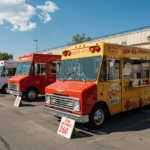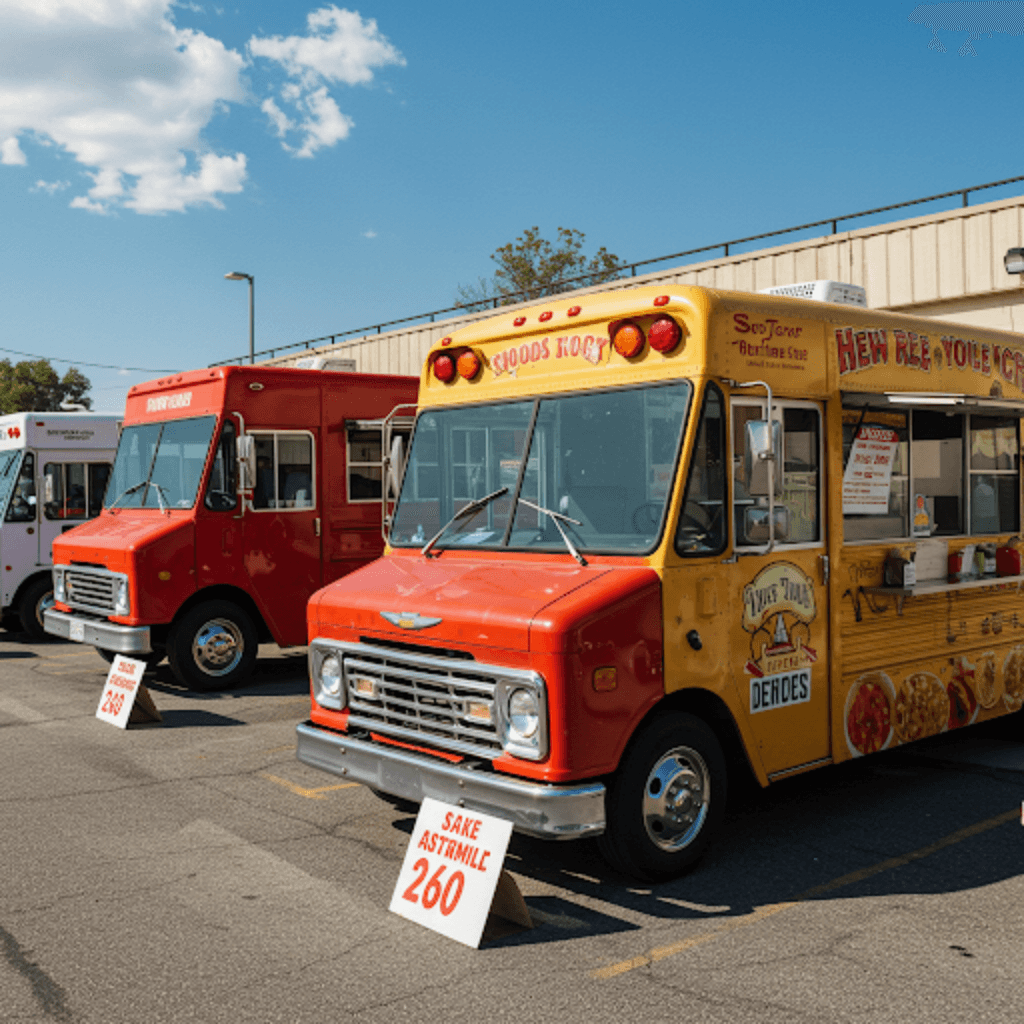
Rolling into entrepreneurship: A comprehensive guide to buying food trucks for sale
The allure of the open road, the sizzle of a hot grill, and the satisfaction of serving delicious food to happy customers – the food truck dream is a powerful one. More than just a trend, the food truck industry has solidified its place in the American culinary landscape, offering a dynamic and potentially lucrative business opportunity. If you’re considering joining the ranks of mobile food vendors, navigating the world of “food trucks for sale” is your first crucial step. This comprehensive guide will equip you with the knowledge you need to make informed decisions and embark on your food truck journey with confidence.
Understanding the food truck market
Before diving into listings and inspections, it’s essential to grasp the current state of the food truck market. The industry has seen significant growth over the past decade, driven by consumer demand for convenient, diverse, and often gourmet-quality food options at affordable prices. The relatively low start-up costs compared to brick-and-mortar restaurants also make food trucks an attractive option for aspiring entrepreneurs.
However, the market is competitive. Success hinges not just on having a great menu, but also on understanding local regulations, securing prime locations, and mastering efficient operations. The type of food truck you choose will also significantly impact your potential market and profitability. Consider popular options like gourmet burgers, tacos, ethnic cuisine, desserts, and specialty coffee. Thorough market research in your target area is crucial to identify unmet needs and potential competition.
Defining your food truck concept and needs

What kind of culinary experience do you want to offer? Your food truck concept is the foundation of your business. Are you passionate about authentic Mexican street food? Do you dream of crafting artisanal pizzas? Or perhaps you envision a mobile coffee shop serving specialty brews? Your concept will dictate the size and type of truck you need, the equipment required, and your overall branding.
Consider these questions when defining your needs:
- What type of cuisine will you serve?
- How much cooking space do you require?
- What specialized equipment is necessary (e.g., fryers, ovens, refrigerators)?
- How many staff members will you need to operate the truck?
- What are your power requirements (generators, propane)?
- What are your water and waste disposal needs?
- What is your budget?
Answering these questions will help you narrow down your search and focus on food trucks that align with your specific requirements.
New vs. used food trucks: Weighing the pros and cons
One of the biggest decisions you’ll face is whether to buy a new or used food truck. Each option has its advantages and disadvantages.
New food trucks
Pros:
- Customization: You can design the truck to your exact specifications, ensuring it perfectly matches your concept and needs.
- Warranty: New trucks typically come with warranties on the chassis and equipment, providing peace of mind.
- Latest technology: You’ll benefit from the latest advancements in kitchen equipment and energy efficiency.
- Financing options: Financing is often easier to secure for new vehicles.
Cons:
- Higher cost: New food trucks are significantly more expensive than used ones.
- Longer lead time: Custom-built trucks can take several months to be completed.
- Depreciation: Like any new vehicle, a food truck will depreciate in value over time.
Used food trucks
Pros:
- Lower cost: Used trucks are much more affordable, allowing you to start your business with less capital.
- Faster acquisition: You can typically purchase and start operating a used truck much sooner than a new one.
- Potential for value: A well-maintained used truck can retain its value relatively well.
Cons:
- Potential for hidden problems: Used trucks may have underlying mechanical or equipment issues that require costly repairs.
- Limited customization: You may have to adapt your concept to fit the existing layout and equipment of the truck.
- Shorter lifespan: Used trucks may have a shorter remaining operational lifespan compared to new ones.
- Financing challenges: Securing financing for a used food truck can be more difficult.
Carefully weigh these pros and cons in relation to your budget, timeline, and long-term goals. If you opt for a used truck, a thorough inspection by a qualified mechanic and food truck specialist is absolutely essential.
Inspecting a used food truck: A crucial step
Never purchase a used food truck without a comprehensive inspection. This is not just a quick look-over; it’s a detailed examination of every aspect of the vehicle and its equipment. Here’s what to look for:
- Chassis and engine: Have a qualified mechanic inspect the engine, transmission, brakes, suspension, and other mechanical components. Look for signs of rust, leaks, or excessive wear and tear.
- Kitchen equipment: Test all appliances, including ovens, fryers, refrigerators, freezers, and ventilation systems. Ensure they are in good working order and meet health code requirements.
- Plumbing and electrical systems: Check for leaks, proper wiring, and adequate power supply. Ensure the generator (if included) is functioning correctly.
- Exterior and interior condition: Inspect the body for damage, rust, or signs of previous accidents. Check the interior for cleanliness, wear, and any necessary repairs.
- Permits and licenses: Verify that the truck has all necessary permits and licenses, and that they are up-to-date. This can vary significantly by state and locality.
- Health inspection records: Review the truck’s past health inspection records to identify any recurring issues.
Don’t hesitate to bring along experts to assist with the inspection. The cost of a professional inspection is a small price to pay compared to the potential expense of unexpected repairs down the road.
Negotiating the price and securing financing
Once you’ve found a food truck that meets your needs and passes inspection, it’s time to negotiate the price. Research comparable trucks for sale to get an idea of fair market value. Be prepared to walk away if the seller is unwilling to negotiate a reasonable price.
Financing options for food trucks include:
- Traditional bank loans: Banks may offer loans for food trucks, but they often require a strong credit history and a solid business plan.
- SBA loans: The Small Business Administration (SBA) offers loan programs that can be used to finance food trucks. These loans typically have favorable terms and interest rates.
- Equipment financing: Some lenders specialize in financing commercial kitchen equipment, which can be used to purchase a food truck.
- Online lenders: Several online lenders offer financing options for food trucks, often with faster approval times than traditional banks.
- Personal loans: In some situation people use own funds.
Compare interest rates, terms, and fees from different lenders to find the best financing option for your situation.
Legal and regulatory considerations
Operating a food truck involves navigating a complex web of local, state, and federal regulations. These regulations can vary significantly from one location to another, so thorough research is essential. Common requirements include:
- Business license: You’ll need a general business license to operate in your chosen city or county.
- Food handler’s permit: All food handlers typically need to obtain a food handler’s permit, which requires completing a food safety course.
- Mobile food vendor permit: Most cities and counties have specific permits for mobile food vendors, which may regulate where and when you can operate.
- Vehicle registration and inspection: Your food truck will need to be registered and inspected like any other commercial vehicle.
- Health permits: You’ll need to pass regular health inspections to ensure your food truck meets sanitation standards.
- Fire safety permits: Food trucks with cooking equipment may require fire safety permits and inspections.
- Zoning regulations: Zoning laws may restrict where you can park and operate your food truck.
- Commissary agreement: Many jurisdictions require food trucks to have a commissary agreement with a licensed commercial kitchen for food preparation, storage, and waste disposal.
Contact your local city or county government to obtain detailed information about the specific requirements in your area. Failure to comply with regulations can result in fines, penalties, or even the closure of your business.
Building your brand and marketing your food truck
A strong brand identity and effective marketing are crucial for attracting customers to your food truck. Develop a memorable name, logo, and visual design that reflects your concept and cuisine. Consider your target audience and create a brand that resonates with them.
Marketing strategies for food trucks include:
- Social media: Utilize platforms like Instagram, Facebook, and Twitter to showcase your food, announce your location, and engage with customers.
- Website: Create a simple website with your menu, hours, location, and contact information.
- Online ordering: Offer online ordering and delivery through third-party platforms or your own website.
- Email marketing: Build an email list to send out newsletters, promotions, and updates.
- Local partnerships: Collaborate with other businesses, events, and organizations to reach a wider audience.
- Public relations: Reach out to local media outlets and food bloggers to generate publicity.
- Loyalty programs: Reward repeat customers with discounts and special offers.
- Catering: Offer catering.
Consistency is key. Maintain a consistent brand voice and visual identity across all your marketing channels. Engage with your customers online and offline, and always strive to provide excellent customer service.
The journey begins
Buying a food truck is a significant investment, but it can be a rewarding one. By conducting thorough research, carefully considering your needs, and diligently navigating the legal and regulatory landscape, you can increase your chances of success in the exciting world of mobile food vending. Remember, the food truck journey is a marathon, not a sprint. Be prepared to work hard, adapt to challenges, and continuously learn and improve. With passion, dedication, and a delicious menu, you can turn your food truck dream into a thriving reality.







